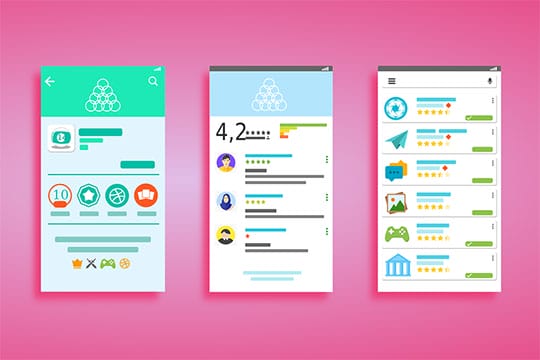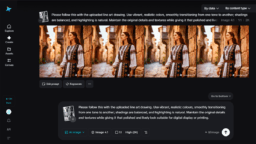For many product owners, there comes an uncertain period of time where the app idea has to be mapped out again in order to integrate it with the app type, they knew nothing or little about. Business objectives are redefined and product goals reinstated to capitalize on the benefits of the app type that they have finally decided to go with.
Mobile applications can be classified into numerous methods that vary in content, category, and their ability to perform. The three well-known types of mobile app development are native apps, web apps, and hybrid apps. All three can be differed by their features, functionalities, process and the time taken in their development.
There is no denying the fact that the cost of developing an application is a chief factor in determining the choice of the mobile app development services on wishes to go for. However, factors such as cost and comparisons do not necessarily bring out the superiority between these three types of apps. All three app types work on different parameters and have their own say when it comes to meeting the demands of user’s needs and expectations.
So, how does one decide between native, hybrid and web app development? What factors does one need to take into account before transforming their app idea into a scalable reality? Let’s find out what makes these 3 an ideal choice for startups, enterprises, and organizations.
Native Apps

Apps that are targeted towards a certain platform (iOS or Android) are native applications. A native powered app intended for Android does not run in the iOS (Apple) ecosystem and vice versa. Because of this, the majority of enterprises and businesses develop mobile applications for each platform and the differences are easily discernible in the look and the feel of the app.
Native apps are built using programming languages such as Java for Android and Objective-C for iOS. To build native apps, developers incorporate top of the line functionalities and UI modules. This results in good user experience, better consistency and performance. The end-users also value from quality features and make extensive use of applications from a wide range of devices. However, they don’t have the simplest tools for maintaining the product. Changes once made take a long time to process and reflect before being published or redistributed to the respective app stores. They also tend to work in the background whether the application is open or not. Due to this, it continues to receive updates and process data without user intervention though changes can be made through devices’ settings.
Native mobile applications are designed to fully comply with the requirements and guidelines of a specific mobile operating system. Apps that are built from native benefits from device features such as GPS, camera, contact list, etc.
Recommended for you: eWallet Mobile App Development – Method & Features.
One should choose native app development when:

- High performance is a priority
- Competitors are vying for similar app ideas and markets
- There are no time constraints. Ideally 6 months before the launch of your native app.
- You plan to update and scale the app on a constant basis.
- There are no budget constraints either.
Web Apps

Web-based application is written in CSS, HTML5 or JavaScript. Unlike an Android or iOS app, there is no SDK (software development kit) for developers to work with. Internet access is a prerequisite requirement for user experience and the proper functioning for this group of apps. Web apps tend to capture more memory space on devices than hybrid and native apps. Because all the end-users databases are stored and saved on servers, a web app user can fetch respective data by any gadget through the net. Progressive web applications have taken modern web development by storm. The web app solution, as opposed to native or hybrid, is the cheapest option that offers minimum functionality. There are frameworks and templates for developing web applications like React, Angular, and Vue.js that one can use to get the best out web apps.
Cross-platform applications are built without a significant disadvantage for the target audience. If your app idea doesn’t demand a complex app with extensive features and complex front-end and back-end, going web app would yield good results in the longer run. A web app development company leverages the use of a web app for simple and straightforward projects.
Advantages of Web apps:

- Since they use a common code base for multiple mobile platforms, web apps are relatively easier to maintain.
- As long as web apps can function in a web browser, they can be built for all platforms.
- Web apps are less expensive than native apps.
- Web apps don’t require approval from the app marketplace and can be released at any time in any format. Therefore, the newest version loads itself without the user having to manage the updates manually.
You may like: What are The Different Phases of Mobile App Development Process?
Hybrid Apps

The idea of the hybrid app is a combination of web and native apps. Apps developed using Sencha Touch, React Native, Xamarin, etc. comes under this group. These are created to support native and web technologies across several platforms. Moreover, these apps are simpler and take less time to develop. With a single code base, these apps can be integrated into multiple mobile operating systems at once. There is no browser needed to run hybrid apps as opposed to web apps. Similar to native apps, hybrid apps let one retain the same ability to access device features.
Since hybrid apps act like browsers, they work well when corresponding to the browser experience on devices. If your product in the making is just a series of pages and low on graphics, then going hybrid is an ideal choice. However, if a product demands a lot of animation and game-like graphics, then this wouldn’t be a good fit at all.
Advantages of Hybrid apps

- Because of hybrid apps native infrastructure, it can work offline.
- Building with a hybrid saves a significant sum of money since one can make one version for multiple platforms. Resources utilized are lower than native powered apps.
- Native is known for its performance, so are hybrid apps if used in the right manner because they don’t have to rely upon much network communication.
- Since Native apps cater to one OS at a time, there is a lack of inter-app interaction. Hybrid brings forward hassle-free integration with other apps and can be effortlessly integrated with across the device’s environment.
Which scores high on user experience and performance – Hybrid or Native?

User experience and performance are crucial factors when it comes to the success of the mobile application. Users like to have a hassle-free experience when it comes to using mobile apps of all sorts. When navigation, functionalities and added features fail to live up to the performance expectation then it directly leads to negative reviews on stores and companies start risk losing business within a fortnight.
Therefore, it’s important for the application’s control, visual cues, interactions, and gestures to be integrated seamlessly with the platform’s wide style guide.
There is no doubt that native apps are reliable and faster. App contents, visual elements, and structures are already set up on the phones that can be instantly loaded when the users navigate native mobile apps.
We seem to have a clear winner here but it’s important to know that Native apps do come with its own challenges as it does not allow developers any flexibility, is time-consuming and requires frequent updates.
You may also like: 9 Ways to Become a Better Mobile App Developer Through Teamwork.
Conclusion

There are many routes on can choose to shape their app idea into a feasible product. All types of apps have their pros and cons with one or the other limitations of money or time. A poor mobile experience might prevent users from using the app again. Therefore, companies targeting a similar audience only get one chance to hit the spot.
Having a free budget doesn’t mean that going native would solve all the problems. The same goes for hybrid or a web app when one is on a low budget. Before you splash your cash, take some time and weigh all the pros and cons of the type of app you would like to have for your dream project. It’s advisable to choose the type of app that fits your needs and not the one that you can afford.
According to some prominent surveys, more than 75% of mobile app users consider app performance as the primary criteria for app engagement and app retention. Apps powered with Native offer an immersive user experience, smooth access, and security but come with its own price. Similarly, hybrid and web apps do have the tendency to outperform native apps only if the app idea synchronizes well with the advantages offered by these 2 types of apps. So, choosing the right platform has become more crucial than ever for emerging and existing brands and service providers in this competitive digital environment.
This article is written by Keval Padia. Keval is the founder & CEO of Nimblechapps, a progressive mobile app development company. He loves to craft a mobile experience that automates business operations. The prospects of future mobile technology entice him to express his views on subjects that he is affiliated with.






